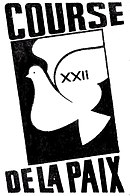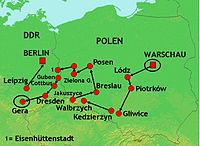International Peace Tour 1969
The 22nd International Peace Tour (Course de la paix) was a cycling race that took place from May 12th to 25th, 1969. Because of the invasion of the Warsaw Pact troops in Czechoslovakia and the suppression of the " Prague Spring " in 1968, the stage race could not lead over the territory of Czechoslovakia for the first time. Only a 105 kilometer long section ran on the Czech side in the Polish-Czech border area. The tour started in Warsaw and ended in East Berlin . The Frenchman Jean-Pierre Danguillaume won the individual competition , while the GDR won the team competition .
Attendees
97 drivers from 14 countries took part in the 22nd Peace Tour. It was the lowest number of teams since 1957. New compared to the previous year, teams from Algeria , Yugoslavia , Morocco and Mexico took part . For the first time the teams competed with seven drivers, only Belgium had nominated only six athletes. The following teams were represented:
The GDR had nominated the following active members: Klaus Ampler , Manfred Dähne , Dieter Gonschorek , Dieter Grabe , Bernd Knispel , Dieter Mickein and Axel Peschel .
mode
In addition to increasing the number of drivers to seven per team, the scoring in the team competition has also been reorganized. Previously, the time of the top three was decisive, but in 1969 the placement of the top four in each team decided on the rank in the team ranking. The leader in the mountain classification wore a pink jersey for the first time on the 22nd Peace Tour. The points ten, seven, five and three were awarded for each of the four mountain ratings. After the last mountain classification, the five best climbers received 60, 40, 30, 20 and 10 seconds credit. The most active driver was awarded the purple jersey again and there were time credits like in the mountain classification.
route
Because of the political upheavals in Czechoslovakia, the 1969 Peace Tour was only carried out in Poland and the GDR. Between Warsaw and East Berlin , 2,036 kilometers had to be covered, which were divided into 15 stages. At 250 kilometers, the sixth stage between Jakuszyce and Breslau was not only the longest of this tour, but also in the history of the Peace Tour so far. On this part of the day, 105 kilometers ran in the Czech border area, and there was also the first mountain classification. Others followed between Cottbus and Dresden and two on the route between Dresden and Gera . Three stages were designed as individual time trials. A special feature of the route were the four bridges between the destination and the next starting point. Wałbrzych and Jakuszyce (5th / 6th stage, 80 km) and Gera and Leipzig (14th / 15th stage, 100 km) were particularly far apart .
Race course
In the first six stages there was still no contender for the overall victory, the wearer of the yellow jersey changed daily . After that it looked like the Pole Ryszard Szurkowski could win the tour. He had already won the second stage and then took over the overall lead for one day. On the mammoth stage to Breslau, Szurkowski drove to third place with an eleven-man leading group, which had a lead of almost eight minutes at the finish, and took over the yellow jersey with a lead of 1:08 minutes. He was able to expand this to over two minutes on the following sections of the day. In the individual time trial of the eleventh stage from Guben to Cottbus, the hour of the Frenchman Jean-Pierre Danguillaume struck . He completed the 58 kilometers in 1:22:01 hours, while Szurkowski took 1:53 minutes longer. Thanks to the time credit of one minute for the day's victory, the Frenchman took over the overall standings, which he was able to successfully defend on the four stages that followed. For a long time, the battle for the blue jerseys in the team competition was fought between the teams of the GDR and the Soviet Union. On the third stage, the GDR drivers took the lead from the Poles who had been leading up to that point and wore the blue jerseys for two days. Then the Soviet Union passed and led to the eighth stage. In the individual time trial on the ninth day of the race, the GDR team regained the lead and already achieved the overall victory on the eleventh day, another time trial, when it took another 15 minutes from the Soviet Union. The lead could be expanded even further as far as East Berlin , and in the end the GDR team was in the front with a plus of 20:51 minutes.
| stage | Start finish | Stage length |
Stage winner | Time (h) | km / h |
| 1 | Around Warsaw | 112 km | Zygmunt Hanusik (Poland) | 2:29:45 | 44.8 |
| 2 | Warsaw - Łódź | 164 km | Ryszard Szurkowski (Poland) | 3:40:32 | 44.5 |
| 3 | Łódź - Piotrków (individual time trial) |
42 km | Axel Peschel (GDR) | 0:59:34 | 42.0 |
| 4th | Piotrków - Gliwice (Gliwice) | 158 km | Dieter Mickein (GDR) | 4:14:50 | 38.3 |
| 5 | Kędzierzyn - Wałbrzych | 202 km | Dieter Mickein (GDR) | 5:34:20 | 36.1 |
| 6th | Jakuszyce - Wroclaw | 250 km | Dieter Gonschorek (GDR) | 6:17:12 | 39.7 |
| 7th | Wroclaw - Poznan | 203 km | Daniel Ducreux (France) | 5:03:22 | 39.9 |
| 8th | Poznan - Zielona Góra | 123 km | Dieter Gonschorek (GDR) | 2:57:24 | 40.9 |
| 9 | Zielona Góra - Świebodzin (individual time trial) |
39 km | Jan Magiera (Poland) | 0:50:03 | 45.9 |
| 10 | Świebodzin - Eisenhüttenstadt | 100 km | Michel Roques (France) | 2:31:46 | 39.2 |
| 11 |
Guben - Cottbus (individual time trial) |
58 km | Jean-Pierre Danguillaume (France) | 1:21:01 | 42.0 |
| 12 | Cottbus - Dresden | 133 km | Dieter Gonschorek (GDR) | 3:12:05 | 41.3 |
| 13 | Dresden - Gera | 168 km | Arthur Van De Vijver (Belgium) | 4:19:17 | 38.8 |
| 14th | Around Gera | 90 km | Willy Scheers (Belgium) | 2:19:45 | 38.6 |
| 15th | Leipzig - East Berlin | 194 km | Andrzej Bławdzin (Poland) | 4:57:39 | 38.9 |
Final results
| Individual evaluation | |||
|---|---|---|---|
| driver | team | time | |
| 1. | Jean-Pierre Danguillaume | France | 51:19:25 h |
| 2. | Ryszard Szurkowski | Poland | + 0:42 min |
| 3. | Dieter Gonschorek | GDR | + 1:58 min |
| 4th | Yuri Dmitriev | Soviet Union | + 7:35 min |
| 5. | Dieter Mickein | GDR | + 7:57 min |
| 6th | Klaus Ampler | GDR | + 11:02 min |
| 7th | Charles Rouxel | France | + 12:50 min |
| 8th. | Andrzej Bławdzin | Poland | + 13:41 min |
| 9. | Gainan Saidchushin | Soviet Union | + 13:59 min |
| 10. | Axel Peschel | GDR | + 14:52 min |
| ... | |||
| 15th | Bernd Knispel | GDR | + 22:35 min |
| 18th | Dieter Grabe | GDR | + 25:52 min |
| 34. | Manfred Dähne | GDR | + 49:19 min |
| ... | |||
| 67. | Bouchaib Morssaline | Morocco | + 6:59:43 h |
| Team ranking | |||
|---|---|---|---|
| team | time | ||
| 1. | GDR | 205: 52: 49 h | |
| 2. | Soviet Union | + 20:51 min | |
| 3. | Poland | + 21:54 min | |
| 4th | France | + 36:05 min | |
| 5. | Denmark | + 2:34:46 h | |
| 6th | Bulgaria | + 2:40:30 h | |
| 7th | Hungary | + 2:58:57 h | |
| 8th. | Belgium | + 3:34:58 h | |
| 9. | Romania | + 3:54:28 h | |
| 10. | Mexico | + 7:11:09 h | |
| 11. | Morocco | + 13:47:59 h | |
| eliminated: Algeria Finland Yugoslavia |
|||
| Mountain classification (pink jersey) | |||
|---|---|---|---|
| driver | team | Points | |
| 1. | Dieter Gonschorek | GDR | 15th |
| 2. | Gainan Saidchushin | Soviet Union | 12 |
| 3. | Arthur Van De Vijver | Belgium | 10 |
| 4th | Jesus Sarabia | Mexico | 10 |
| 5. | Vladimir Cherkassov | Soviet Union | 10 |
| ... | |||
| Most active driver (purple jersey) | |||
|---|---|---|---|
| driver | team | Points | |
| 1. | Yuri Dmitriev | Soviet Union | 26th |
| 2. | Zygmunt Hanusik | Poland | 25th |
| 3. | Arthur Van De Vijver | Belgium | 21st |
| 4th | Jean Ronsmans | Belgium | 21st |
| 5. | Dieter Mickein | GDR | 20th |
| ... | |||
literature
- Klaus Ullrich. Every time in May . Sportverlag Berlin, 1987, ISBN 3-328-00177-8 . Pp. 284-290
- GDR sports newspaper Deutsches Sportecho , issues May 1969
- XXII. International Peace Trip 1969. New Germany, Berlin 1969, 34 pages

